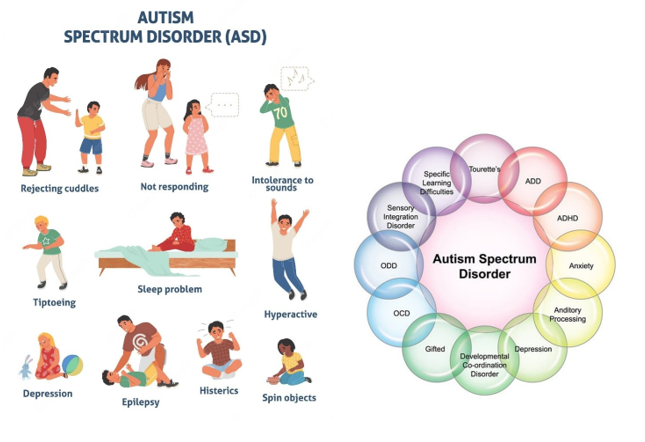The nurse is caring for a toddler with autism spectrum disorder and failure to thrive. Which intervention should the nurse implement?
Provide structured meal times.
Offer food even if disinterested.
Incorporate play during meals.
Allow multiple food choices.
The Correct Answer is A
Children with autism spectrum disorder may have difficulty with sensory processing, social interactions, and communication, which can contribute to feeding difficulties and failure to thrive. Providing structured meal times is an important intervention to help establish a routine and promote consistency and predictability.
Structured meal times involve setting a specific time for meals and snacks, providing a calm and quiet environment, and limiting distractions. This can help the child focus on the task of eating and reduce sensory overload that may interfere with feeding. The nurse should also ensure that the child is seated comfortably and at an appropriate height for feeding.
Offering food even if disinterested (B), incorporating play during meals (C), and allowing multiple food choices (D) are not necessarily helpful interventions for a toddler with autism spectrum disorder and failure to thrive. Offering food when the child is not interested may reinforce negative feeding behaviors and can contribute to further feeding difficulties. Incorporating play during meals may distract the child from the task of eating and can be counterproductive. Allowing multiple food choices can be overwhelming for the child and may not promote a consistent and structured feeding routine.
Therefore, the nurse should prioritize providing structured meal times as an important intervention for promoting feeding and growth in a toddler with autism spectrum disorder and failure to thrive.

Nursing Test Bank
Naxlex Comprehensive Predictor Exams
Related Questions
Correct Answer is ["1.8"]
Explanation
The nurse should administer 1.8 mL of diazepam.
To calculate the volume of diazepam to be administered, you would first calculate the total dose of diazepam for this child by multiplying the child's weight (30 kg) by the prescribed dose (0.3 mg/kg). This calculation gives a total dose of 9 mg (30 kg x 0.3 mg/kg = 9 mg). Next, you would divide the total dose (9 mg) by the concentration of the medication (5 mg/mL) to determine the volume to be administered. This calculation gives a volume of 1.8 mL (9 mg / 5 mg/mL = 1.8 mL).

Correct Answer is A
Explanation
The nurse should inspect the posterior oropharynx of a child who is frequently swallowing after tonsillectomy to assess for bleeding or the presence of clots. Swallowing frequently can be a sign of postoperative bleeding, which is a potential complication of tonsillectomy.
Touching the tonsillar pillars to stimulate the gag reflex or asking the child to speak would not provide information about the presence of bleeding.
Assessing for teeth clenching or grinding is not related to this particular observation.

Whether you are a student looking to ace your exams or a practicing nurse seeking to enhance your expertise , our nursing education contents will empower you with the confidence and competence to make a difference in the lives of patients and become a respected leader in the healthcare field.
Visit Naxlex, invest in your future and unlock endless possibilities with our unparalleled nursing education contents today
Report Wrong Answer on the Current Question
Do you disagree with the answer? If yes, what is your expected answer? Explain.
Kindly be descriptive with the issue you are facing.
